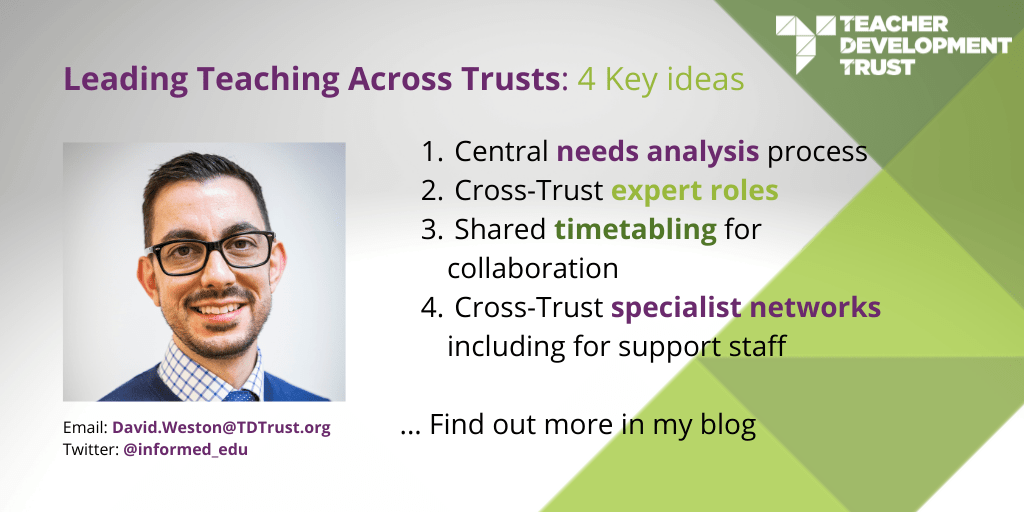David Weston, TDT’s CEO, reflects on key principles for Trust leaders when thinking about leading for effective teaching quality and collaboration across their schools.
Leading great teaching across a trust is a series of puzzles:
- How do we create a shared consistency while leaving flexibility for each school’s leaders to meet local needs?
- How do we create efficiencies of shared central training while leaving scope to meet each school and teacher’s individual needs?
- How do we ensure each school is rooted in its local community while also ensuring that all Trust staff feel rooted in the Trust ethos and identity?
In the early days of Trusts, the focus was all about growth. This was replaced by a greater focus on back-office efficiency, shared services and school improvement intervention for the weakest schools. But the puzzles mentioned above require a new level thinking: how do we lead our schools to generate great quality teaching in every classroom? How do we ensure that every staff member is constantly getting better? In a nutshell, how do we lead Teaching and Development across Trusts?
Here are four key principles from Teacher Development Trust’s work with Trusts on this area:
- When designing central programmes and offers, invest more time than you might think in conducting needs analysis with staff in each school – ask explicitly which programme of central training day or which central training programmes would be most helpful. Summarise findings and reflect back with a “you said, we heard” activity with opportunity for more feedback. Repeat this activity each year so that refinements can be built in.
- It can be difficult to achieve a balance between the expertise of your central team and building expertise in each school. Consider creating part time school roles where your best subject, phase and specialist leaders can do some teaching, some coaching of colleagues and some cross-Trust delivery. This keeps your experts grounded in everyday reality while building networks. Some Trust use SLE designation to achieve this.
- It can be helpful to support each school in timetabling shared PPA time-slots for subject and phase teams at the same time. This can not only facilitate within-school shared planning but leaves the possibility of cross-school collaboration using virtual meetings and digital shared documents.
- Encourage the growth of cross school networks for middle leaders and then grow to include other staff. Many Trusts already do this for English and Maths, but also consider all subject, all key phases and support staff teams – for the latter you can create networks of finance teams, exams teams, site managers, reception teams, teaching assistants, etc. – then ensure that these teams are also connected to national specialist networks and that they have shared online document areas to share ideas.
These four ideas are just the tip of the iceberg and there’s a great deal of complexity for this important area. We’re exploring much more in a series of mini-summits during October 2021, in association with the Confederation of School Trusts and the TES. You can buy one ticket for all 5 breakfast meetings which feature key national experts, 5 exceptional Trust case studies and time to network and discuss.
Wednesday 7th October, 8am to 9am
Leora Cruddas, CEO, Confederation of School Trusts
Mark Greatrex, Chief Executive, Bellevue Place Education Trust
Friday 9th October, 9am to 10am
Sean Harford, National Director of Education, Ofsted
Will Smith, Greenshaw Learning Trust
Tuesday 20th October, 8am to 9am
Dame Alison Peacock, Chief Executive, Chartered College of Teaching
Sufian Sadiq and Nadine Cotton, Chiltern Learning Trust
Wednesday 21st October, 8am to 9am
Sir David Carter, Ambition Institute
Lynn James, Outwood Grange
Thursday 22nd October, 8am to 9am
Andrew Warren, West Midlands Regional Schools Commissioner
Paul James, River Learning Trust




